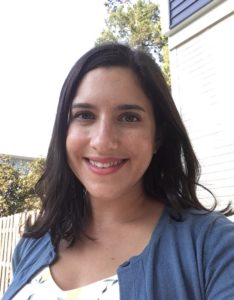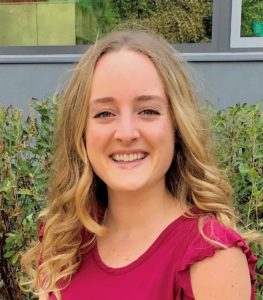Spotlight on Emerging ADHD Researchers
Zuali Malsawma
Attention Magazine February 2021
Download PDF
Outstanding new ADHD researchers contribute to our increasing knowledge of ADHD. CHADD is honored to present its 2020 Young Scientist Research Awards to two deserving, emerging researchers: Whitney Fosco, PhD, and Lauren Oddo, MS. They were selected from a pool of highly qualified applicants by respected members of CHADD’s professional advisory board.
These award recipients presented exceptional academic records and a substantial number of published and ongoing research studies. Each selected one study for the reviewers to examine for significance, rigor of methodology-design, clarity of problem, adequacy of literature review as well as data analysis, and contribution of new knowledge. Their submissions received the highest overall ratings among the applications received, and they provide summaries of their winning research papers here.
Whitney Fosco, PhD
 Brain networks demonstrate synchronous patterns of activity, known as connectivity. Connectivity studies almost exclusively evaluate the average degree of connectivity, even though the strength of connectivity fluctuates over short and long time scales. Given that inconsistency in attention and behavior is a hallmark feature of ADHD, the current study evaluated whether changes in connectivity differed among 8-12-year-old youth with and without ADHD who completed structural and functional (resting state and task) neuroimaging. We focused on the task-positive dorsal attention network and the task-negative default mode network. These networks should ideally be weakly or inversely related, given their opposing functions.
Brain networks demonstrate synchronous patterns of activity, known as connectivity. Connectivity studies almost exclusively evaluate the average degree of connectivity, even though the strength of connectivity fluctuates over short and long time scales. Given that inconsistency in attention and behavior is a hallmark feature of ADHD, the current study evaluated whether changes in connectivity differed among 8-12-year-old youth with and without ADHD who completed structural and functional (resting state and task) neuroimaging. We focused on the task-positive dorsal attention network and the task-negative default mode network. These networks should ideally be weakly or inversely related, given their opposing functions.
Groups did not differ in their overall, average connectivity, but they did differ in the stability of connectivity. Youth with ADHD had stable and fairly high connectivity throughout the scan. Youth without ADHD demonstrated a gradual increase in connectivity over time, reaching a similar strength of connectivity as their peers with ADHD by the end. Further, stronger connectivity was associated with worse and/or more inconsistent performance on a reaction-time task. These preliminary findings suggest that considering how brain network connections vary across time may help refine our understanding of the neurobiology of ADHD and linkages between brain functioning and behavior.
Whitney Fosco, PhD, is an assistant professor of psychiatry and behavioral health at Penn State Hershey Medical Center. She earned her PhD in clinical psychology from the University at Buffalo, SUNY in 2018. Her research aims to elucidate mechanisms of pharmacological and psychosocial treatment response in youth with ADHD.
Lauren Oddo, MS
 The transition from childhood to independent adulthood is a uniquely vulnerable yet understudied developmental period for young people with ADHD, wherein rates of depression, alcohol and drug misuse, and related risk behaviors skyrocket. College, in particular, is a high-risk developmental period for depression and the initiation and escalation of alcohol and drug misuse, given the uptick in demands for independence and self-regulated behavior within a social context supporting the heavy use of alcohol and other drugs. Lauren Oddo’s research is guided by socioecological models of developmental psychopathology, and considers environmental, interpersonal, and intrapersonal risk factors for depression, alcohol/drug misuse, and risk behaviors among youth with ADHD as they enter adolescence and young adulthood. In her project, called the College Lifestyles Study (CLS), she applies novel mobile survey technology to examine the daily decision-making processes and social-emotional experiences that underlie risk for these common concerns in college students with ADHD. Results from CLS will be a critical first step in understanding where youth with ADHD go awry in their daily decision-making and which risk factors and “real world” behavioral/environmental targets should be addressed in interventions.
The transition from childhood to independent adulthood is a uniquely vulnerable yet understudied developmental period for young people with ADHD, wherein rates of depression, alcohol and drug misuse, and related risk behaviors skyrocket. College, in particular, is a high-risk developmental period for depression and the initiation and escalation of alcohol and drug misuse, given the uptick in demands for independence and self-regulated behavior within a social context supporting the heavy use of alcohol and other drugs. Lauren Oddo’s research is guided by socioecological models of developmental psychopathology, and considers environmental, interpersonal, and intrapersonal risk factors for depression, alcohol/drug misuse, and risk behaviors among youth with ADHD as they enter adolescence and young adulthood. In her project, called the College Lifestyles Study (CLS), she applies novel mobile survey technology to examine the daily decision-making processes and social-emotional experiences that underlie risk for these common concerns in college students with ADHD. Results from CLS will be a critical first step in understanding where youth with ADHD go awry in their daily decision-making and which risk factors and “real world” behavioral/environmental targets should be addressed in interventions.
Lauren Oddo, MS, is a doctoral candidate in clinical psychology at the University of Maryland, College Park. Her research applies longitudinal methodology and novel technologies to improve the outcomes of youth with ADHD during high-risk transitional periods for the development of depression, alcohol and drug misuse, and related health risk behaviors.
Zuali Malsawma, MS, the health sciences librarian at CHADD’s National Resource Center on ADHD, manages the Young Scientist Research Awards program.
Other Articles in this Edition
I Don’t Speak to You That Way. Please Show Me Some Respect!
Is Exposure to Nature Related to ADHD Symptoms?
Addressing Barriers and Disparities: Black Americans and ADHD
Ten Ways You Can Help Your Child Succeed Socially When They Return to School
Help Your Child with Screen Resistance or Anxiety in Distance Learning
Promoting Resilience Among Children and Teens During the COVID-19 Pandemic
Your Lifestyle Will Determine Your Future
Evidence-Based Coaching for Adults with ADHD
